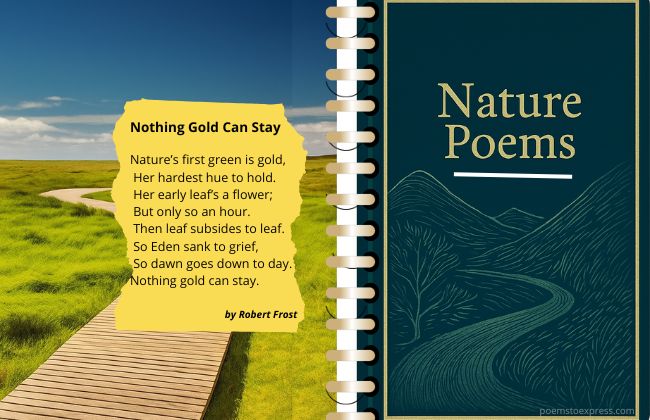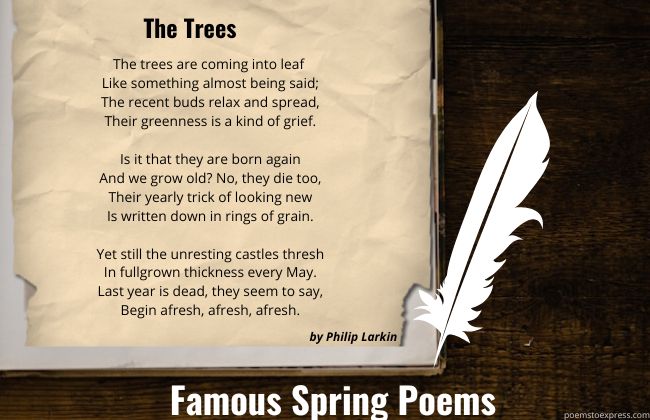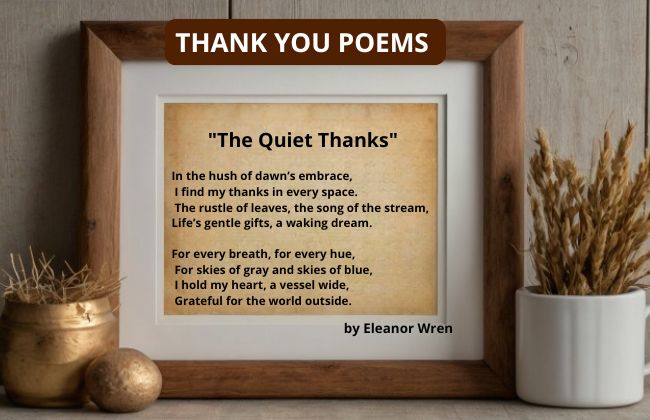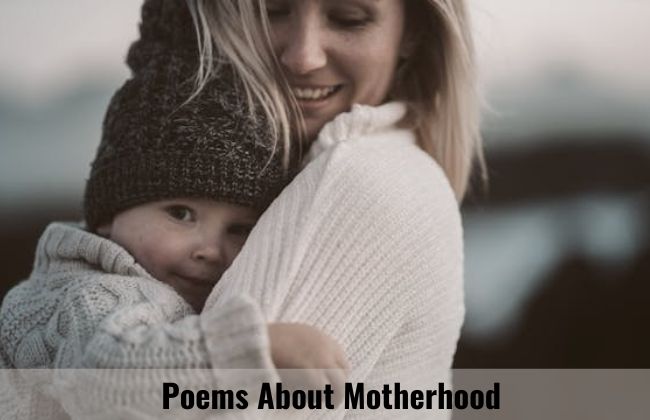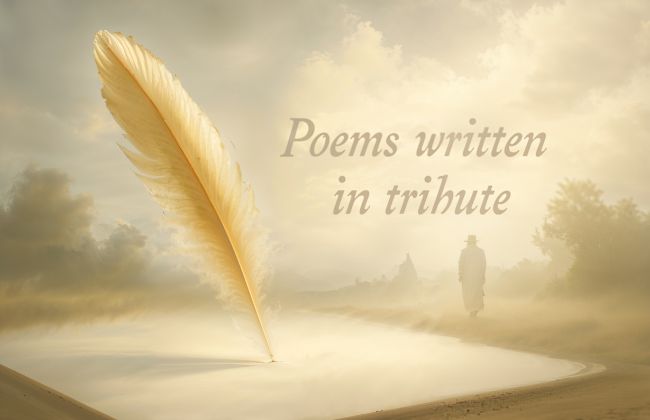Poems about death are a form of literary expression that tackles one of the most universal and complex themes of human existence: the end of life.
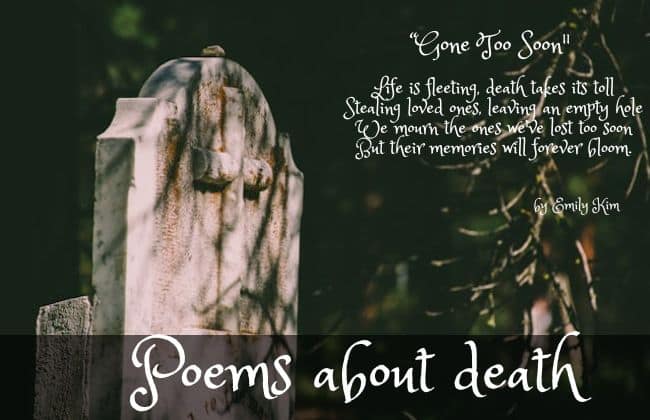
These poetic compositions manage to capture the essence of mortality and reflect on its significance in our lives.
Through metaphors, imagery, and emotions, they invite us to contemplate death from different angles and connect us with our deepest humanity.
There is no doubt that death is a difficult topic to address, but poems about it offer us a unique and poignant perspective.
So, we invite you to immerse yourself in these lines and let yourself be carried away by their evocative power.
Explore and find the poems about death that can inspire you in moments of reflection or loss of a loved one!
Table of Contents
Famous poems about death
Because I Could Not Stop For Death by Emily Dickinson
Because I could not stop for Death –
He kindly stopped for me –
The Carriage held but just Ourselves –
And Immortality.
We slowly drove – He knew no haste
And I had put away
My labor and my leisure too,
For His Civility –
We passed the School, where Children strove
At Recess – in the Ring –
We passed the Fields of Gazing Grain –
We passed the Setting Sun –
Or rather – He passed us –
The Dews drew quivering and chill –
For only Gossamer, my Gown –
My Tippet – only Tulle –
We paused before a House that seemed
A Swelling of the Ground –
The Roof was scarcely visible –
The Cornice – in the Ground –
Since then – ‘tis Centuries – and yet
Feels shorter than the Day
I first surmised the Horses’ Heads
Were toward Eternity –
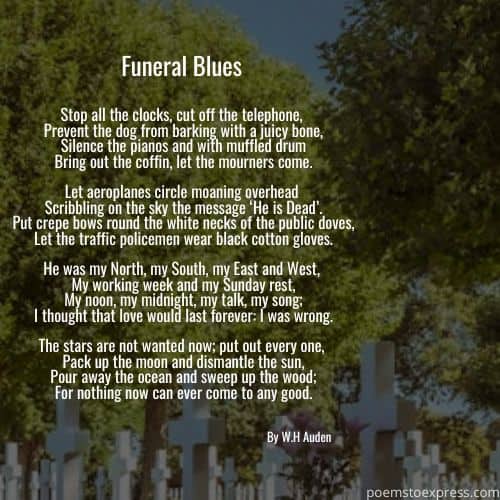
Do Not Go Gentle Into That Good Night by Dylan Thomas
Do not go gentle into that good night,
Old age should burn and rave at close of day;
Rage, rage against the dying of the light.
Though wise men at their end know dark is right,
Because their words had forked no lightning they
Do not go gentle into that good night.
Good men, the last wave by, crying how bright
Their frail deeds might have danced in a green bay,
Rage, rage against the dying of the light.
Wild men who caught and sang the sun in flight,
And learn, too late, they grieved it on its way,
Do not go gentle into that good night.
Grave men, near death, who see with blinding sight
Blind eyes could blaze like meteors and be gay,
Rage, rage against the dying of the light.
And you, my father, there on the sad height,
Curse, bless, me now with your fierce tears, I pray.
Do not go gentle into that good night.
Rage, rage against the dying of the light.
Funeral Blues by W.H Auden
Stop all the clocks, cut off the telephone,
Prevent the dog from barking with a juicy bone,
Silence the pianos and with muffled drum
Bring out the coffin, let the mourners come.
Let aeroplanes circle moaning overhead
Scribbling on the sky the message ‘He is Dead’.
Put crepe bows round the white necks of the public doves,
Let the traffic policemen wear black cotton gloves.
He was my North, my South, my East and West,
My working week and my Sunday rest,
My noon, my midnight, my talk, my song;
I thought that love would last forever: I was wrong.
The stars are not wanted now; put out every one,
Pack up the moon and dismantle the sun,
Pour away the ocean and sweep up the wood;
For nothing now can ever come to any good.
Do Not Stand at My Grave and Weep by Mary Elizabeth Frye
Do not stand at my grave and weep
I am not there; I do not sleep.
I am a thousand winds that blow,
I am the diamond glints on snow,
I am the sun on ripened grain,
I am the gentle autumn rain.
When you awaken in the morning’s hush
I am the swift uplifting rush
Of quiet birds in circled flight.
I am the soft stars that shine at night.
Do not stand at my grave and cry,
I am not there; I did not die.
Death Be Not Proud by John Donne
Death, be not proud, though some have called thee
Mighty and dreadful, for thou art not so;
For those whom thou think’st thou dost overthrow
Die not, poor Death, nor yet canst thou kill me.
From rest and sleep, which but thy pictures be,
Much pleasure; then from thee much more must flow,
And soonest our best men with thee do go,
Rest of their bones, and soul’s delivery.
Thou art slave to fate, chance, kings, and desperate men,
And dost with poison, war, and sickness dwell,
And poppy or charms can make us sleep as well
And better than thy stroke; why swell’st thou then?
One short sleep past, we wake eternally
And death shall be no more; Death, thou shalt die.
Short Poems About Death
In poetry, there are words that, despite their brevity, unfold a deep understanding and respect for that unavoidable moment.
Short poems about death invite us to reflect on the fragility of existence, the ephemeral nature of life, and sometimes offer us comfort in moments of loss.
These verses condense great truths and emotions into a few lines, presenting a perspective on death that only art can provide.
We invite you to explore some of these impactful poems, where every word matters and every pause conveys an emotion.
The Final Goodbye by Alice Johnson
Death's sharp scythe cuts through life
Leaving behind tears and strife
For those who must say farewell
To loved ones lost, in death's cruel spell.
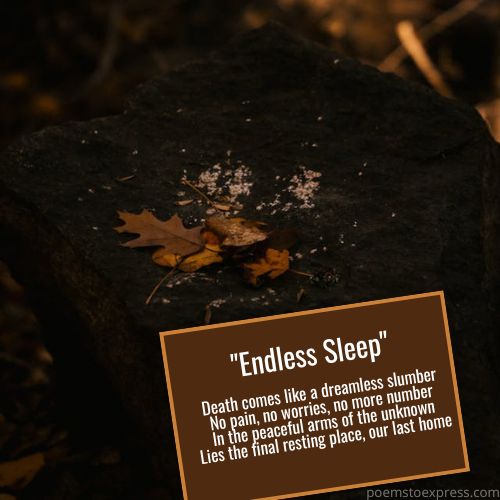
Endless Sleep by Jason Lee
Death comes like a dreamless slumber
No pain, no worries, no more number
In the peaceful arms of the unknown
Lies the final resting place, our last home.
Ashes to Ashes by Samantha Chen
We are but mere dust and bones
Once vibrant, now silent as stones
Death claims us all, without exception
Leaving behind memories, but no redemption.
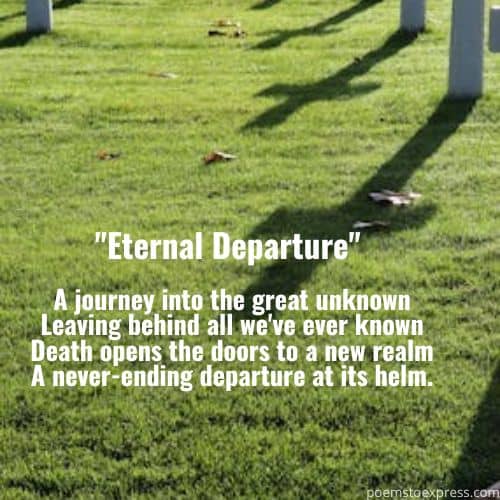
Eternal Departure by Marcus Black
A journey into the great unknown
Leaving behind all we've ever known
Death opens the doors to a new realm
A never-ending departure at its helm.
Gone Too Soon by Emily Kim
Life is fleeting, death takes its toll
Stealing loved ones, leaving an empty hole
We mourn the ones we've lost too soon
But their memories will forever bloom.
Poems about death of a loved one
The loss of a loved one is one of the most painful and challenging experiences to face in life. Faced with this overwhelming pain, we often find solace in poetry, a form of expression that allows us to unleash our deepest emotions.
If you have lost someone special, we invite you to immerse yourself in this collection of poetry and find solace in reflection and verse.
Gone Too Soon by anonymous
You were here just yesterday,
With a smile that lit up the room,
But now you have gone away,
Leaving us in a shroud of gloom.
We thought we had more time,
To make memories and to bond,
But now it feels like a crime,
That your life has come to an end.
You had so much left to do,
So many dreams left to pursue,
But death came and took you,
Leaving us with a heartache that grew.
We mourn for all that could have been,
And for the love that we'll never see bloom,
Our hearts forever scarred within,
For our loved one who left too soon.
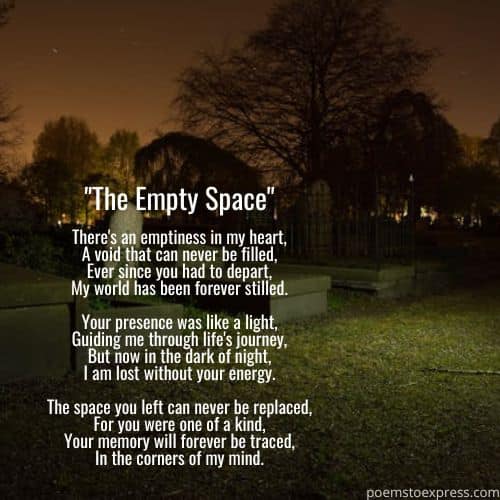
The Empty Space by anonymous
There's an emptiness in my heart,
A void that can never be filled,
Ever since you had to depart,
My world has been forever stilled.
Your presence was like a light,
Guiding me through life's journey,
But now in the dark of night,
I am lost without your energy.
The space you left can never be replaced,
For you were one of a kind,
Your memory will forever be traced,
In the corners of my mind.
Saying Goodbye by anonymous
The hardest part is saying goodbye,
To the one we hold so dear,
Knowing we won't see them again,
And only left with memories to share.
We'll miss your laughter,
And your comforting embrace,
But in our hearts you'll live forever,
In a special, sacred place.
Goodbye, our dear loved one,
Though you may be gone,
Your spirit will always shine,
As we carry on and on.
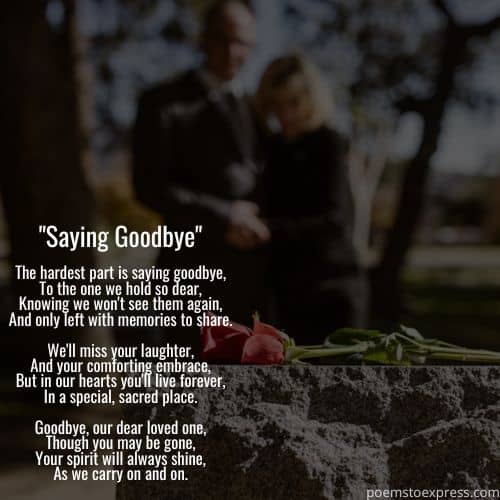
In Loving Memory by anonymous
In loving memory, we say goodbye,
To the one who touched our hearts,
Though you had to spread your wings and fly,
Our love for you will never depart.
You may be gone, but never forgotten,
For your presence still lingers near,
In every sunset, in every blossom,
Your memory becomes crystal clear.
We'll miss your voice, your touch,
And the way you made us feel,
But in our hearts, you'll forever be,
A cherished, treasured seal.
Beautiful poems about death
Death is a topic that we often avoid in our conversations and thoughts, as it brings fear and distress.
However, there are poems that address this subject in a beautiful and profound way, allowing us to reflect on death as a natural part of life.
These poems invite us to confront our fears and to find comfort and lessons in contemplating death.
The Cycle of Life and Death by anonymous
The leaves fall from the trees,
As nature's way of letting go,
They dance in the autumn breeze,
And softly land below.
The cycle of life and death,
Is a wondrous and mysterious force,
It takes away with every breath,
But also gives life, of course.
For death is not an end,
But a new beginning,
A chance for the soul to transcend,
Into a realm of eternal living.
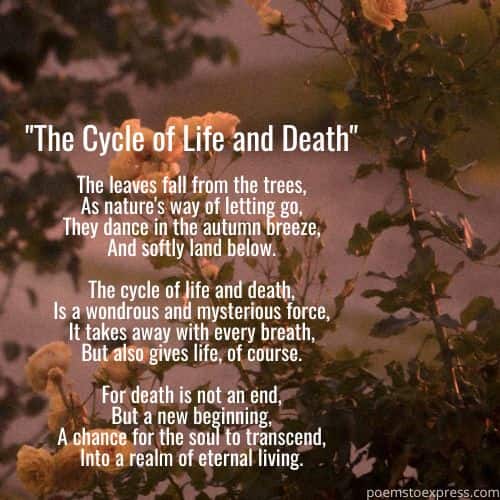
The Beauty in Letting Go by anonymous
Death may seem like a dark abyss,
A final farewell to those we miss,
But there's a certain beauty in letting go,
A peaceful surrender that we come to know.
Like a butterfly shedding its cocoon,
Death allows our spirits to bloom,
Into a world of endless love,
In the arms of the One above.
It's not an end, but a new chapter,
A chance to let go of all our fears,
To reunite with loved ones after,
And wipe away all our tears.
Whispers in the Wind by anonymous
As we mourn the loss of those we hold dear,
Their spirits are never truly gone, I fear,
For though their physical presence may leave,
Their essence will forever stay and weave.
Whispers in the wind, echoes in the trees,
We can still feel their love in the gentle breeze,
Their voices in the laughter of a child,
Their warmth in the sun's rays, so mild.
They may have left our earthly sight,
But their spirits still shine ever so bright,
Guiding us on our journey ahead,
Until one day, we'll all once again be led.
A New Dawn by anonymous
Death may bring an end to this life,
But it also marks a new beginning,
In the midst of all the heartache and strife,
There's a glimmer of hope, softly glinting.
For every end, there's a new dawn,
A chance for the soul to be reborn,
In a world beyond our comprehension,
Where joy and love have no expiration.
So let us not mourn, but celebrate,
The souls that have passed through heaven's gate,
For they have lived, and now they rest,
In a place of eternal peace and happiness.
The Role of Poetry in Confronting Death
Poetry serves as both mirror and medicine when we face mortality. Unlike prose, which often explains death, poetry experiences it, offering readers a shared emotional space where grief, acceptance, and wonder can coexist.
Processing Grief and Loss
When someone dies, words often fail us. Poetry fills this silence by giving form to formless pain. The rhythmic structure of verse provides a container for overwhelming emotions, while metaphor allows us to approach unbearable truths indirectly.
Consider how many people turn to poetry during funeral services or memorial gatherings. These verses don’t just describe loss—they create a ritual space where mourning becomes communal rather than isolitary. The act of reading or hearing poetry about death transforms private grief into shared human experience.
Finding Meaning in Mortality
Poetry helps us wrestle with death’s biggest questions:
- Why do we die?
- What happens after death?
- How should we live knowing death awaits?
- What legacy do we leave behind?
Rather than providing definitive answers, death poetry offers perspectives that comfort, challenge, and inspire. Each poem becomes a lens through which readers can examine their own beliefs and fears about mortality.
Creating Connection Across Time
When you read a poem about death written centuries ago, you’re connecting with someone who faced the same fundamental human experience you will. This connection transcends cultural, linguistic, and temporal boundaries, reminding us that while individual deaths are unique, the experience of mortality is universal.
Themes in Death Poetry
Death poetry explores several recurring themes that reflect humanity’s complex relationship with mortality. Understanding these themes helps readers appreciate the depth and variety within this literary tradition.
Loss and Grief
The most immediate theme in death poetry concerns loss—of loved ones, of opportunities, of innocence, of youth.
Poets approach grief from multiple angles:
Personal Loss: Elegies for specific individuals explore how death transforms relationships, leaving survivors to navigate a world forever changed by absence.
Collective Loss: Some poems address mass deaths from war, disease, or disaster, examining how communities process shared trauma.
Anticipated Loss: Many poets write about their own approaching death or the inevitable loss of loved ones still living.
The Search for Immortality
Humans have always sought ways to transcend mortality, and poetry explores various forms of immortality:
- Spiritual immortality through religious belief
- Legacy immortality through children, art, or achievements
- Memory immortality through being remembered by others
- Nature immortality through returning to the earth
Poets often present immortality as both consolation and illusion, acknowledging our deep need for permanence while recognizing death’s finality.
Acceptance and Resignation
Many death poems focus on achieving peace with mortality. This theme manifests differently across cultures and individuals:
- Philosophical Acceptance: Some poets view death as natural and inevitable, finding comfort in life’s cycles.
- Spiritual Surrender: Religious poets often frame death as returning to divine source or fulfilling God’s plan.
- Stoic Resignation: Others advocate for dignified acceptance of death’s inevitability without necessarily finding comfort in it.
The Afterlife and Beyond
Questions about what follows death generate diverse poetic responses:
- Vivid descriptions of heaven, hell, or other religious afterlives
- Agnostic wonderings about post-death existence
- Materialist perspectives on consciousness ending with bodily death
- Mystical visions of cosmic unity or reincarnation
Symbolism and Imagery in Death Poetry
Symbolism (using objects/ideas to represent deeper meanings) and imagery (vivid sensory descriptions) make death poetry evocative.
They transform abstract concepts into relatable visuals.
Key Symbols
- The Reaper/Grim Reaper: Personifies death as a skeletal figure with a scythe, symbolizing harvest of souls (e.g., in medieval art and poems).
- Rivers or Crossings: Represent transition to the afterlife, like the River Styx in Greek mythology or in Christina Rossetti’s “Up-Hill.”
- Darkness/Night: Oblivion or peace, as in Emily Dickinson’s frequent use of “eternity” tied to dusk.
- Flowers: Fragility of life (wilting roses) or rebirth (lilies).
Imagery Techniques
- Visual: “The cold earth slept below” from Percy Shelley’s “Dirge,” painting a serene yet chilling scene.
- Auditory: The tolling bells in John Donne’s “For Whom the Bell Tolls,” evoking communal mourning.
- Tactile: The chill of death in Keats’s “Ode to a Nightingale,” where the speaker longs for “easeful Death.”
Notable Poets and Their Perspectives on Death
Understanding how master poets approach death deepens our appreciation for the tradition’s richness and variety.
Emily Dickinson (1830-1886)
Dickinson revolutionized death poetry through her intimate, often startling perspectives on mortality. Living as a recluse in Amherst, Massachusetts, she developed a unique voice that treated death as both familiar companion and mysterious stranger.
Key Characteristics of Dickinson’s Death Poetry:
- Personification of death as a courteous gentleman caller
- Focus on the moment of dying rather than aftermath
- Mixture of Christian imagery with personal mythology
- Unexpected metaphors that make death both ordinary and extraordinary
Famous Example: “Because I could not stop for Death” presents death as a polite carriage driver taking the speaker on a leisurely ride through life’s stages toward eternity.
Edgar Allan Poe (1809-1849)
Poe’s death poetry emphasizes the gothic, mysterious, and psychologically disturbing aspects of mortality. His work explores death’s terror while finding perverse beauty in decay and loss.
Key Elements in Poe’s Death Poetry:
- Gothic atmosphere with ravens, tombs, and haunted landscapes
- Focus on death’s horror rather than comfort
- Exploration of grief’s madness and obsession
- Musical quality that hypnotizes readers
Notable Work: “The Raven” uses repetitive rhythm and rhyme to create a trance-like meditation on loss and memory’s persistence.
John Donne (1572-1631)
Donne, a metaphysical poet and Anglican priest, brought intellectual rigor and religious faith to death poetry. His work often argues with death rather than simply accepting it.
Donne’s Approach to Death:
- Metaphysical conceits that compare death to unexpected objects or experiences
- Christian confidence in resurrection and eternal life
- Intellectual argumentation with death’s power
- Integration of physical and spiritual concerns
Celebrated Example: “Death Be Not Proud” directly challenges death’s authority, arguing that death itself will die when humanity achieves eternal life.
Walt Whitman (1819-1892)
Whitman approached death with democratic inclusivity and cosmic optimism. His death poetry celebrates life’s continuity rather than mourning its end.
Whitman’s Death Philosophy in Poetry:
- Death as natural part of cosmic unity
- Democratic vision where all deaths matter equally
- Focus on life’s abundance rather than death’s scarcity
- Celebration of physical and spiritual aspects of existence
Significant Work: “When Lilacs Last in the Dooryard Bloom’d,” his elegy for Abraham Lincoln, transforms personal grief into national healing.
Contemporary Voices
Modern and contemporary poets continue expanding death poetry’s boundaries:
Sylvia Plath: Explored death through personal psychological lens, often with startling honesty about suicide and mental illness.
W.S. Merwin: Approaches death through environmental and spiritual perspectives, seeing human mortality within larger ecological cycles.
Mary Oliver: Found solace in nature’s death-and-renewal cycles, offering gentle wisdom about mortality’s place in natural order.

